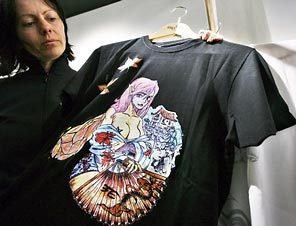Striped shirts, gray hoodies and dark-brown jackets are the mainstay of the men's collection at Haeftling, or Prisoner, which opened Friday in the German capital.
Miniskirts made of coarse denim and sweaters with hidden pockets — useful for smuggling drugs past prison guards — make up the ladies' label.
"Our entire look is robust and adjusted to prison," said spokeswoman Karola Schoewe. "We use hard materials, and there will never be a lot of color."
A limited-edition T-shirt was designed by inmates in Texas — with voluptuous women similar to the tattoos that adorn some prisoners' arms and chests.
Convicts at prisons all over Germany are involved in the production and receive between $2.65 and $3.39 an hour for their work, said Ahmad Keyaniyan, who opened the Berlin store.
"The prison administrations love the whole idea and their inmates are really proud that their creations get recognition in the real world," Keyaniyan said.
Not all the clothes are created or designed behind prison walls — some of the street wear is produced by regular workers in Poland and India.
But Keyaniyan says that 3 to 5 percent of every item he sells goes to prisoner-related charities, among them Amnesty International and the German Initiative Against Death Penalty.
The Berlin shop is the only one in Germany so far, but it's not the first to draw its inspiration from inmate apparel.
Saggy pants fashion in the United States is believed to have started in prisons, where inmates are issued ill-fitting jumpsuits but no belts to prevent hangings and beatings. The look was popularized in gangster rap videos.
As for prices at Haeftling, it's unlikely many real convicts could afford the products. T-shirts sell for between $44 and $59, button-down shirts for $117 and a women's brown coat costs $412.











